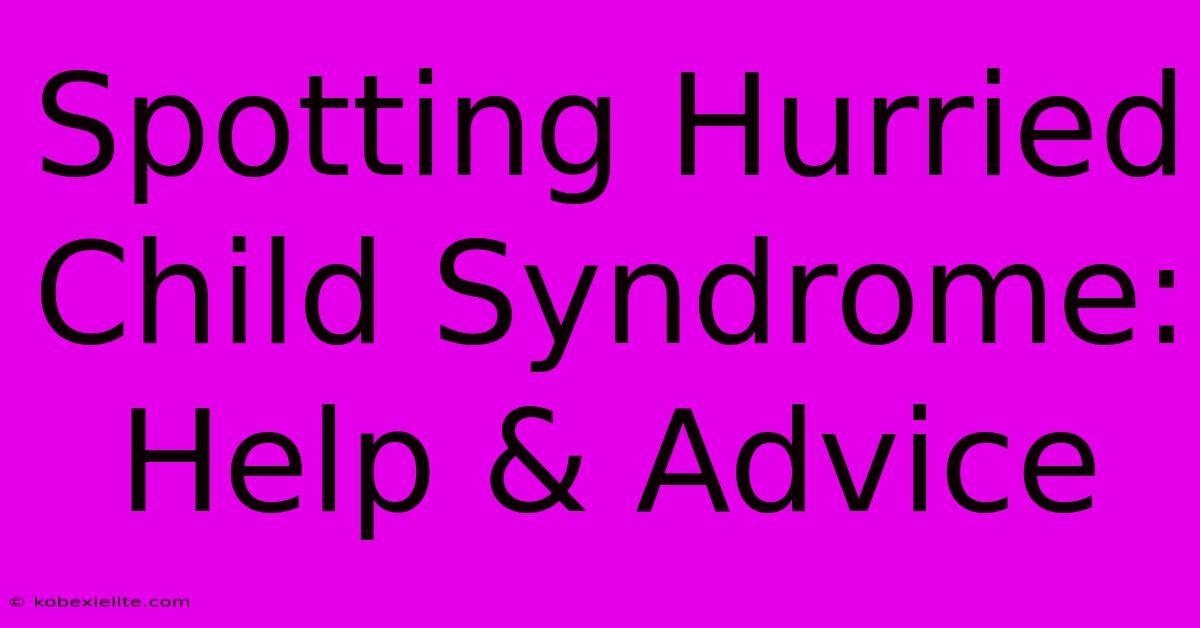Spotting Hurried Child Syndrome: Help & Advice

Discover more detailed and exciting information on our website. Click the link below to start your adventure: Visit Best Website mr.cleine.com. Don't miss out!
Table of Contents
Spotting Hurried Child Syndrome: Help and Advice
Are you noticing a trend? Children seem to be growing up faster, pressured by adult expectations and a relentless pace of life. This isn't just a feeling; it's a potential sign of Hurried Child Syndrome (HCS). Understanding its signs, causes, and solutions is crucial for fostering healthy child development. This comprehensive guide will equip you with the knowledge and tools to identify and address HCS.
What is Hurried Child Syndrome?
Hurried Child Syndrome, a term coined by child psychologist David Elkind, describes the phenomenon of children being pushed to grow up too quickly. This isn't about ambition; it's about robbing children of their childhood—their time for play, exploration, and simply being. The pressure to achieve, excel academically, and participate in numerous extracurricular activities often leaves children feeling overwhelmed, stressed, and robbed of their innocence.
Key Characteristics of HCS:
- Over-scheduled lives: Children are constantly rushing from one activity to the next, with little time for downtime or unstructured play.
- Adult-like responsibilities: Children are burdened with responsibilities beyond their developmental stage, such as managing finances or household chores.
- Emphasis on achievement: Success, often measured solely by academic performance or external accolades, is prioritized over personal growth and well-being.
- Loss of childhood innocence: The carefree aspects of childhood, like imaginative play and spontaneous fun, are minimized or lost entirely.
- Increased anxiety and stress: The relentless pressure leads to increased anxiety, stress, and even depression in children.
- Sleep deprivation: Over-scheduling often results in inadequate sleep, hindering healthy development and cognitive function.
Recognizing the Signs of Hurried Child Syndrome in Your Child:
Identifying HCS early is vital. Look for these common signs:
- Physical symptoms: Headaches, stomachaches, sleep disturbances, and changes in appetite.
- Behavioral changes: Irritability, mood swings, anxiety, withdrawal, and difficulty concentrating.
- Academic struggles: Despite possessing intelligence, the child may struggle academically due to stress and lack of time for learning.
- Loss of interest in hobbies: The child may lose interest in activities they previously enjoyed.
- Complaints of being tired or overwhelmed: Listen to your child's verbal expressions of feeling pressured or overwhelmed.
Causes of Hurried Child Syndrome:
Several factors contribute to the development of HCS:
- Parental pressure: Well-intentioned parents often push their children towards achievement, sometimes unintentionally creating undue pressure.
- Societal expectations: Our culture often glorifies achievement and success, creating an environment where children feel pressure to conform.
- Competitive environments: Highly competitive schools and extracurricular activities can exacerbate the problem.
- Lack of downtime: A lack of unstructured play and free time hinders development and relaxation.
Helping Your Child Overcome Hurried Child Syndrome:
Addressing HCS requires a multifaceted approach:
1. Prioritize Downtime and Unstructured Play:
Schedule time for boredom! Allow your child time for unstructured play, which fosters creativity, problem-solving, and social skills.
2. Limit Extracurricular Activities:
Don't over-schedule your child. Prioritize a few activities that genuinely interest them, allowing time for rest and relaxation.
3. Foster a Growth Mindset:
Emphasize effort and learning over grades and achievements. Celebrate progress, not just perfection.
4. Encourage Open Communication:
Create a safe space for your child to share their feelings and concerns without judgment.
5. Seek Professional Help:
If you suspect your child is suffering from HCS, don't hesitate to seek professional help from a child psychologist or therapist.
The Importance of Childhood:
Childhood is a precious and irreplaceable time for development and exploration. By recognizing and addressing HCS, we can help children thrive and develop into well-adjusted, happy adults. Remember, it's not about being the best, it's about being well. Let's reclaim childhood and give our children the gift of time to simply be.

Thank you for visiting our website wich cover about Spotting Hurried Child Syndrome: Help & Advice. We hope the information provided has been useful to you. Feel free to contact us if you have any questions or need further assistance. See you next time and dont miss to bookmark.
Featured Posts
-
William Byron Two Wins In A Row
Feb 18, 2025
-
Eddie Murphys Snl 50 Triumph
Feb 18, 2025
-
Snls 50th Anniversary Celebrating Comedy
Feb 18, 2025
-
Dan Aykroyds Snl Bass O Matic
Feb 18, 2025
-
Aubrey Plaza Snl Tribute To Late Husband
Feb 18, 2025
